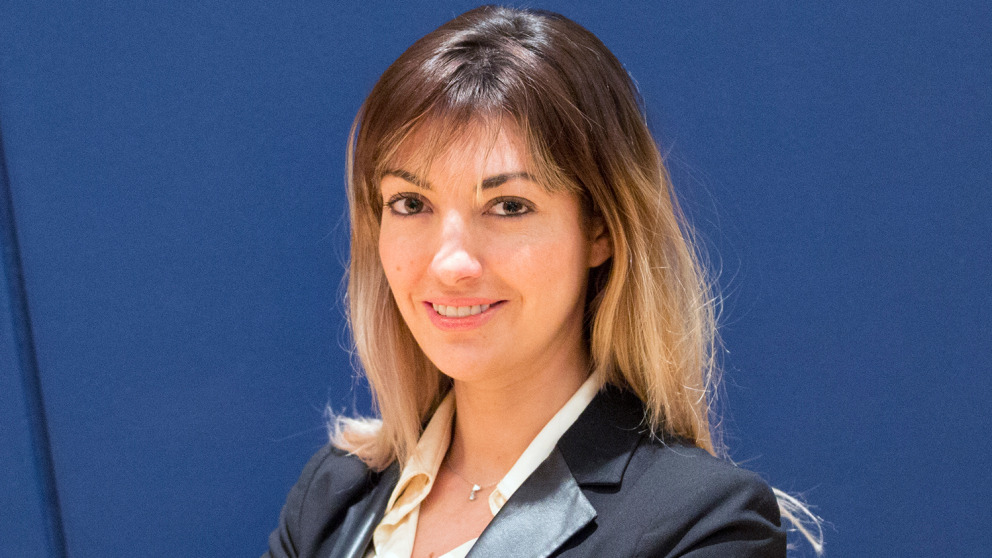IASS Welcomes Inaugural Klaus Töpfer Sustainability Fellow
10.09.2019
Brazilian health expert Nicole de Paula has been awarded the inaugural Klaus Töpfer Sustainability Fellowship. De Paula has served as the executive director of the Global Health Asia Institute (GHAI) since 2016. The Bangkok-based think tank studies the synergies between sustainable development and public health and supports interventions to build resilience among populations. She is also the founder of “Resilient Nomads”, a social enterprise enhancing environmental and health literacy. The 36-year-old won over an international jury with her excellent scientific references and extensive experience in policy consulting and cooperation with UN institutions.

The Klaus Töpfer Sustainability Fellowship is named after the former Federal Minister for the Environment, Executive Director of the United Nations Environment Programme and founding director of the IASS, Klaus Töpfer. The fellowship was established by the IASS to honour and support individuals who build bridges between science, politics and society. Nicole de Paula will spend a year in Potsdam researching how cooperation between actors in the fields of sustainable development and health can be improved. According to her thesis, “silo mentalities” continue to hamper cooperation and are impeding progress.
De Paula holds a PhD in Political Science with a focus on International Relations from the Sciences Po Paris. Her doctoral thesis was awarded the Young Researcher Prize of the Treilles Foundation in France. As a member of the Commission for Education and Communication (CEC) of the International Union for Conservation of Nature (IUCN), she is committed to strengthening recognition of the links between nature conservation and health.
INTERVIEW WITH NICOLE DE PAULA
Breaking the silos for planetary health: how environmental change affects your health
In your work at the Global Health Asia Institute you try to raise awareness about the connections between environmental protection and public health. Why do you think that’s still necessary?
We are well aware that polluted air and pesticides are bad for us. But we still need to better understand how exactly environmental changes caused by human activities are responsible for the rise of new diseases or the aggravation of existing ones. The challenge is that many medical problems are still considered in isolation. Designing progressive environmental policies can enhance solutions for public health. Our bodies are not isolated entities or mechanical units. They respond to stressors related to socio-environmental factors. That’s why I’m a big fan of the concept of “planetary health”. I think it really captures the strong connections between a healthy planet and healthy people. Experts should try to look beyond their own fields to see the bigger picture, since no single discipline or country can save the planet from the harm we, humans, are causing at the risk of our health.
You come from Brazil, where the destruction of the Amazon Rainforest has accelerated since the inauguration of President Bolsonaro. But he refuses to heed advice from abroad.
There’s no question that the fires in the Amazon Rainforest are terrible. And while Bolsonaro’s actions are problematic, it doesn’t help to point the finger at the Global South without acknowledging that economic growth in the North was fuelled by the depletion of its own natural resources and continues to depend on external raw materials. . This progress has hidden price tags, which are now presenting themselves in the form of excessive pollution, mental illnesses, antimicrobial resistance, the climate crisis, obesity and other problems. Emerging and developing countries need to take a different route and strike a balance between nature conservation and economic development. With my work, I hope to put these issues at the centre of policy circles to drive change.
How will the Klaus Töpfer Sustainability Fellowship help you to do that?
What I particularly admire about Klaus Töpfer and the IASS is their commitment to “transdisciplinary science”, where academics from the natural, social and human sciences work together on sustainability topics with representatives of politics and civil society. That’s precisely where my focus and experience lie. At the Global Health Asia Institute, we help local communities to get involved in generating knowledge and solutions at the interface between ecology and health. We now know that it’s counterproductive to arrive on the scene and try to impose solutions “from above”. In rural parts of Cambodia or Laos, for example, it makes sense to incorporate the views of local communities as they have knowledge to share with scientists. In many cases, pre-defined academic research questions are not even relevant at the local level.
What are your plans for your fellowship year?
I would like to use my fellowship to publish what I have learned about how to make planetary health a local reality. With my fellowship, I also hope to create new networks across Latin America to raise the profile of the topic of planetary health and contribute to the next Planetary Health Annual Meeting, which will take place in Brazil in the spring of 2021. Above all, I want to focus on putting women at the centre of planetary health solutions. For example, I would like to use the Global Female Leaders Summit in Berlin to launch a “Women for Planetary Health” initiative, where influential women could act as mentors and supporters of projects that enhance the education and agency of young girls in the most vulnerable areas of our planet. I also believe that art, and not only science, can inspire change.
Contact
